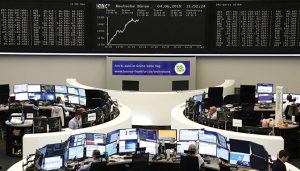Bloomberg
European stocks rise, heading for their best weekly advance since mid-March as investors returned to risk assets, lured by cheaper valuations.
The Stoxx Europe 600 Index added 0.6% by 9:57 am in London. Consumer and tech sectors outperformed, while utilities and energy shares lagged after the UK government announced windfall tax plans on oil and gas companies.
While European stocks have been under pressure this year amid a flurry of concerns spanning the war in Ukraine and recession fears from central bank tightening, dip buyers returned this week. Citigroup Inc strategists recommend buying European shares following the selloff on their appealing valuations compared to the US after a steep global selloff.
Adding to positive sentiment, some of the largest Chinese technology companies beat sales estimates, boosting tech shares in the country. The Stoxx 600 is set for a gain of about 2% this week, the biggest since mid-March.
“It’s been a positive week that could show markets have started to stabilize, with equities having already repriced,†said Nieves Benito, head of fundamental research at Santander Asset Management. “Markets have already priced in central banks’ tightening paths and China is showing more support so, all in all, we see more certainty than weeks ago when volatility was so high.â€
In the week to May 25, European stock funds had outflows of $200 billion, their fifteenth week of redemptions, according to Bank of America Corp.’s note citing EPFR Global data. Overall, investors added about $20 billion to global stock funds in the week as dip buyers returned.
Among individual movers, Maisons du Monde plunged 25% after the French retailer cut its forecasts for the year.
It’s Going to Get Harder for UK Stocks to Keep Outperforming
UK stocks are having an unusually good year. But with headwinds including stalling commodities prices, a windfall tax on major companies and a cost-of-living crisis, the outperformance may not last.
After being unpopular among investors for years, the FTSE 100 Index has solidly outperformed peers this year with a 2.4% gain. The euro-area’s Euro Stoxx 50 has dropped 13%, while the S&P 500 is down 15%.
“Boring old commodity producers, utility providers and tobacco stocks have come to the UK market’s rescue,†said Russ Mould, investment director at AJ Bell. The benchmark has a 23% weighting in energy and mining stocks, and 31% in defensives like staples and healthcare.
Commodities companies are highly dependent on oil and metals prices and Chinese demand, which is showing signs of weakness. Industrial metal prices have fallen 24% since a peak in March, while Chinese economic growth is slowing down. Oil prices remain elevated, but are sensitive to a slowdown and developments around oil supply and the war in Ukraine.
“I think the FTSE 100 has a problem outperforming other more cyclical markets in the second half of this year,†said Liberum strategist Joachim Klement. “We expect oil prices to remain stable at current levels but that means that while energy companies will continue to print money, the share price upside is limited.â€
At the same time, the announcement of a so-called windfall tax on oil and gas companies will hurt profits for some index members. Power company SSE Plc and United Utilities group Plc dropped on the news.
With FTSE members generating about three quarters of revenues overseas, the blue-chip gauge has also been helped by a weaker pound. But this too could become a problem.
Strategists in a monthly Bloomberg survey think the UK’s outperformance may have gone as far as it can, seeing no more upside for the benchmark this year, compared with 9% return potential for the Euro Stoxx 50.
 The Gulf Time Newspaper One of the finest business newspapers in the UAE brought to you by our professional writers and editors.
The Gulf Time Newspaper One of the finest business newspapers in the UAE brought to you by our professional writers and editors.
